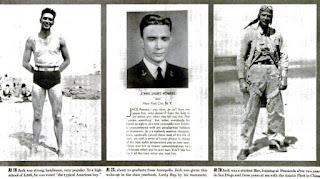"I am
going to get a direct hit."
His
classmates at George Washington High School voted him “the typical American boy.” That
sums up the story of Navy Lieutenant John James Powers.
"He
never thought of himself as any sort of hero," said LIFE Magazine. But Powers
was a great hero. In the Battle of the Coral Sea in early May 1942, his
superhuman actions decisively turned the battle in the Allies favor—at the cost
of his own life. For his heroism and sacrifice, he won the Medal of Honor,
America's highest military honor.
Powers
grew up "in the
big city wilderness," according to LIFE. To be precise, he called the Washington
Heights section of Manhattan home. "He shot immies [glass marbles with swirls],
played cops and robbers, had fist
fights, joined the Boy Scouts,
went hiking, fishing, and sailing." In high school he was "a good but not an exceptional student.”
He must have been better than good,
because he won a hard-to-get appointment to the U.S. Naval Academy at
Annapolis. Cadets nicknamed him Jo-Jo. His roommate wrote his senior profile in
the yearbook. It read: "Sure we know him, who doesn’t? That “certain something” that makes everybody his
friend on sight is Jo’s most noticeable trait.
"Entirely unencumbered with any peculiarities, hobbies, or
diversions, Jo is a markedly positive character, keen, caustically cynical
about most of his life of ours, yet with a sense of humor always in charge of the most stable temperament you’ve ever seen. Never trust
him to respect conventionalities. He’s a hilarious rebel, and his own man.
You'll like him for it all the more when you meet him."
Punch
in the face
He must have been a tough guy among
tough guys—he made the boxing team. Double tough, he could take a punch in the
face and give one back.
After graduating in 1935, he did a tour in China and in
1942 was serving as a squadron commander aboard the U.S.S. Yorktown, flying a Douglas Dauntless dive bomber.
A Japanese armada planned to invade
the strategic port of Port Moresby in New Guinea. Thus far in World War II, the
Japanese had been unstoppable. Had their plan succeeded, their next target
would have been Australia. That's why Australians call the Battle of the Coral
Sea "The Battle That Saved Australia."
(The event
was historic for two other reasons. First, it was the first battle in which
aircraft carriers engaged each other. Second, it was the first naval battle
fought at a distance. Neither side saw each other or directly fired on each
other.)
The
Allies went into battle outnumbered. Besides the Yorktown, they had only one
other carrier in the fight, the U.S.S. Lexington. The Japanese had three
carriers—the Shoho, Shokaku, and Zuikaku.
During
the first day of the battle, Powers sank the carrier Shoho. He "scored a direct hit on [the] carrier which burst
into flames and sank soon after," according to his Medal of Honor
citation.
“Scratch
one flattop,” radioed Lt. Robert E. Dixon, a pilot from the U.S.S. Lexington.
That
wasn't enough to satisfy Powers. On that day and the next, according to his
citation, "in the face of blasting enemy anti-aircraft fire" he "demolished
one large enemy gunboat, put another gunboat out of commission, [and] severely
damaged an aircraft tender and a twenty thousand ton transport."
The next
morning, immediately before takeoff, Powers gave a pep talk to the men in his
squadron. "Remember—the folks back home are counting on us," he told
them. "I am going to get a direct hit if I have to lay it on the flight
deck."
That is
what he did. To make good on his promise, he led his squadron to the Shokaku. Once there, he dove his plane
from 18,000 feet through a barrage of fierce anti-aircraft fire directly onto
the carrier's deck.
Awed by his valor
Whether
Powers intended to crash onto its deck is unclear. He was last seen through
smoke and debris 200 feet above the carrier. The Douglass Dauntless was known
to be difficult to fly when laden a 500- to 1,000-pound bomb.
Though
the Shokaku stayed afloat, it
required such extensive repairs it was unavailable to the Japanese at the
Battle of Midway, the decisive battle of the Pacific war in which the Japanese
lost four carriers.
Awed by
Powers' valor, President Roosevelt devoted a Fireside Address to him in
September 1942. He repeated what Powers told his fellow fliers—"The folks
back home are counting on us."
Then FDR
drove his message home: “You and I are the folks back home," and he went on, asking his listeners, are we “playing our part ‘back home’ in winning
the war?” Then he answered his own question, saying, "We are not doing enough.”
A year
or so earlier on Father’s Day, Powers sent a telegram to his father who
had served in the Navy and fought in the Spanish-American War. The message
read: "Dear
Dad one thousand miles away
doesn’t’ make any difference and your bad son is thinking of you hoping that he
is worthy of being called a chip off the old block."
He was worthy.
MORAL:
Do what needs doing for your folks back home.



No comments:
Post a Comment